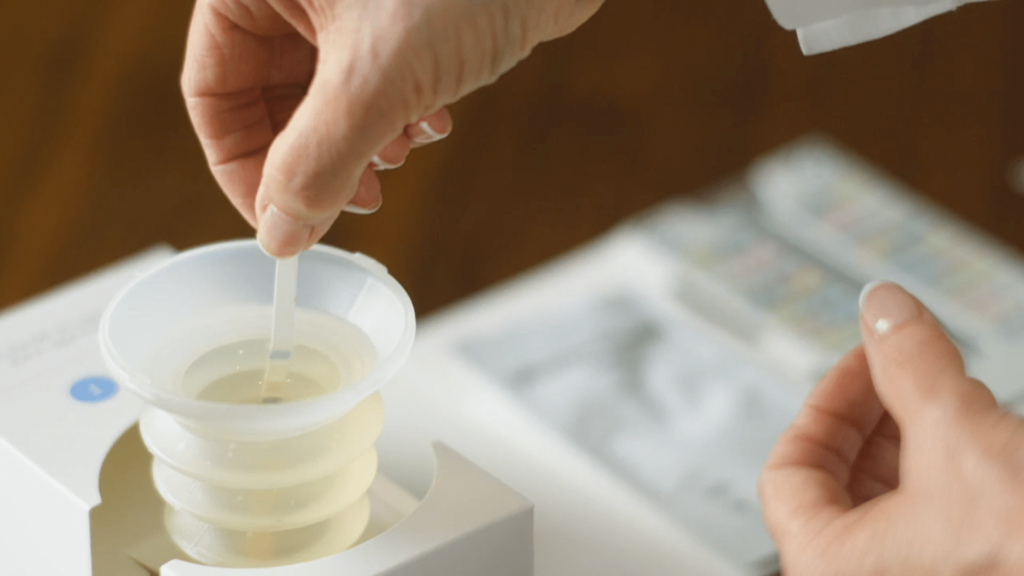Urine albumin-to-creatinine ratio testing is crucial for kidney health evaluation. But testing rates remain low. Reasons for this include ordering complications, provider shortages, and unsuccessful incentive programs. Minuteful Kidney provides an affordable solution for health plans to support providers and drive test completion, improving health outcomes and quality metrics.
Since the nineteenth century, it has been standard practice to look for protein in urine as an early indicator for kidney damage and possible chronic kidney disease (CKD). As medicine has developed over time, the albumin-to-creatinine ratio (ACR) test that checks urine for elevated levels of albumin, the protein most highly correlated with poor health outcomes, has become recognized as one of the strongest early predictors of kidney failure and cardiovascular events.
Despite clinical guidelines, only about 20% of those at-risk complete their recommended annual ACR testing. Without this test, patients may miss out on the care they need to slow or reverse the progression of kidney disease. Increasing adherence to ACR testing allows for proactive disease management while also helping providers and health plans improve risk stratification and quality metrics.
It’s Complicated
Multiple factors contribute to low ACR test completion rates despite its benefits. Some, such as barriers to care, like lack of access and awareness, affect members. Other factors complicate providers’ efforts to test their at-risk populations. An ACR test is not a part of a routine testing panel like a glomerular filtration rate (GFR) blood test, which tests for creatinine in the blood as an additional indicator of kidney function. An ACR test must be ordered separately by a provider for at-risk patients and then completed and processed by a lab. Unfortunately, this process is unnecessarily cumbersome with wide variation in practice.
Unlike most tests, when ordering an ACR test, providers must indicate two Current Procedural Terminology (CPT®) codes. CPT® codes are a uniform coding system for health services to help improve efficiency and accuracy. With two CPT® codes as opposed to a standard one, ACR testing falls short on both goals.
In 2018, the National Kidney Foundation (NKF), the American Society for Clinical Pathology, leading laboratories, and clinical laboratory societies acknowledged these complexities and united to simplify kidney testing ordering and reporting through a unified test profile called the Kidney Profile. Despite this initiative, the Kidney Profile has yet to gain significant traction or become standardized across healthcare institutions in the US.
With recurrent ordering and reporting variation, ACR testing leads to needless complications for providers, laboratories, and health plans that can contribute to low testing rates. Without intervention, ACR testing rates will likely remain low despite its importance for the early detection of CKD and identifying risk for complications such as cardiovascular disease, especially in patients with diabetes.
The New Kidney Health Quality Metric (HEDIS KED)
More recently, in recognition of the threat of CKD and its associated complications, the NKF and National Committee for Quality Assurance (NCQA) introduced a new HEDIS® measure to improve kidney health by increasing ACR and GFR testing rates for people with diabetes. HEDIS® results are used widely by health plans and members to track the effectiveness and performance of plans and providers.
The new Kidney Health Evaluation for Patients with Diabetes (KED) measure evaluates the percentage of adults with diabetes who receive both a GFR and an ACR test every year. This measure was introduced as “a giant step towards engaging the nation’s health plans, integrated health networks, and individual primary care practitioners to improve the diagnosis of kidney disease.”
If ACR testing rates do not improve, health plans’ performance rates will drop from an average of 85% to 49% under this new measure. Hopefully, this incentive to improve quality metrics will motivate health plans and providers to increase kidney health testing rates as it becomes more established. However, the measure doesn’t address the need for a solution that simplifies the existing complications for providers.
The Provider Challenge
The US Department of Health and Human Services National Center for Health Workforce Analysis predicts that there will be a national shortage of 23,640 full-time equivalent primary care physicians by 2025 as an aging population increases demand and fewer students specialize in primary care fields. This shortage of providers will make effective, efficient, and time-saving solutions even more critical. However, many health plans still rely on providers to increase test adherence instead of investing in forward-thinking solutions.
A 2019 study in the American Journal of Managed Care looked at the implementation of an intervention to target members at risk for CKD and improve their quality of care. This study was a comprehensive effort integrated into existing care pathways and electronic ordering systems with financial incentives for providers and significant educational resources provided to over 7,000 patients. Despite this comprehensive endeavor, ACR test completion only improved by 2% over two years. As the majority of health plans are unable to implement such an extensive plan, they will likely see even less significant results.
A Unique At-Home Option
Minuteful Kidney provides an innovative, at-home ACR test solution for untested members to supplement and support the efforts of providers. Minuteful Kidney is the first FDA-cleared, smartphone-powered kidney test kit that provides instant, clinical-grade results from home. Results are then shared directly with the user’s provider and health plan for a seamless experience and appropriate follow-up care.
To improve access to testing without burdening providers, this service works with health plans to reach untested, at-risk members by sending a test kit directly to their home. By dramatically raising test adherence rates, Minuteful Kidney can increase early detection among members who otherwise may not have tested—improving health outcomes for members and supporting risk stratification and quality metrics for health plans and providers. This solution also removes the complexity of CPT codes at the time of ordering as they are matched automatically with the appropriate codes for submission.
At Healthy.io, our goal is to empower patients, providers, and health plans by offering a comprehensive, at-home alternative to overly complicated lab-based ACR testing. With predicted care shortages in the coming years, Minuteful Kidney helps ease the testing burden on providers while ensuring there won’t be gaps in attention for the patients who need it most.
To learn more about how Minuteful Kidney can support your health plan members, schedule a meeting with a Healthy.io team member






